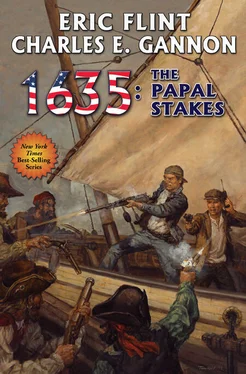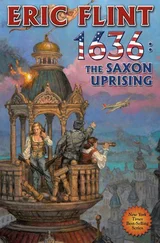Eric Flint - 1635 - The Papal Stakes
Здесь есть возможность читать онлайн «Eric Flint - 1635 - The Papal Stakes» весь текст электронной книги совершенно бесплатно (целиком полную версию без сокращений). В некоторых случаях можно слушать аудио, скачать через торрент в формате fb2 и присутствует краткое содержание. Жанр: Исторические приключения, на английском языке. Описание произведения, (предисловие) а так же отзывы посетителей доступны на портале библиотеки ЛибКат.
- Название:1635: The Papal Stakes
- Автор:
- Жанр:
- Год:неизвестен
- ISBN:нет данных
- Рейтинг книги:3 / 5. Голосов: 1
-
Избранное:Добавить в избранное
- Отзывы:
-
Ваша оценка:
- 60
- 1
- 2
- 3
- 4
- 5
1635: The Papal Stakes: краткое содержание, описание и аннотация
Предлагаем к чтению аннотацию, описание, краткое содержание или предисловие (зависит от того, что написал сам автор книги «1635: The Papal Stakes»). Если вы не нашли необходимую информацию о книге — напишите в комментариях, мы постараемся отыскать её.
1635: The Papal Stakes — читать онлайн бесплатно полную книгу (весь текст) целиком
Ниже представлен текст книги, разбитый по страницам. Система сохранения места последней прочитанной страницы, позволяет с удобством читать онлайн бесплатно книгу «1635: The Papal Stakes», без необходимости каждый раз заново искать на чём Вы остановились. Поставьте закладку, и сможете в любой момент перейти на страницу, на которой закончили чтение.
Интервал:
Закладка:
The weapon sounded like a small cannon going off. The far horse, the one on the right-hand side of the road, caught the great mass of the shot in its chest. The creature screamed, went down frontwards, spilling the rider roughly onto the road. The second horse, hit by two, maybe three, balls in the breast and the foreleg, staggered then reared desperately.
Aiming slightly higher, Tom squeezed the other trigger.
The second blast did not seem as loud, probably because he expected it. This charge of shot caught the same, stricken horse in the side as it was wheeling in panic, its rider hauling at the reins in an attempt to control it. The ribcage of the animal rippled under a spatter of bloody eruptions; a similar splatter of red appeared between the rider’s hip and kidney. Together, man and beast fell sideways.
Tom did not see them hit the ground. Dropping the shotgun, he leaned back behind the immense tree-trunk and snatched up his waiting cap-and-ball revolver. His back covered against fire from the rearmost rider, he drew a two-handed bead on the point-man, who had pulled his mount around and had his wheel-lock pistol already in hand, looking for the source of the attack.
Tom fired, resteadied, fired, resteadied. Just before he triggered off a third shot, he saw that he had hit the target with his second bullet: the rider flinched as a dull red puff momentarily obscured his right clavicle. Probably aiming at Tom’s muzzle flash, he discharged his own weapon in unison with Tom’s third shot.
Which cut through the Spaniard’s diaphragm and dumped him out of his saddle; his return shot hummed into the upslope forest to Tom’s left, snapping twigs as it went.
A moment later, Tom heard the report of another wheel lock. He simultaneously felt and heard a thump deep in the tree behind him. No time to waste.
Tom leaned around the darker, upslope side of the tree, drew a bead on the last horseman, who had already yanked a second pistol from his saddle-brace. Tom fired; the Spaniard fired. They both missed. The horseman reached for his next pistol; Tom fired again. Another miss-but it grazed the horse’s flank, causing the creature to rear and the rider to consider the rate of fire he was obviously facing. He pulled his mount around and sped back the way he had come, riding low and forward in the saddle.
Rather than waste a shot, Tom ran into the road, pistol up and ready. The first rider who had gone down was dead: the open eyes, staring almost straight back over his shoulder, bore witness to his snapped neck. The lead rider-the third Tom had shot-was not moving, nor was he making any noise audible over the perpetual rumble of the cataract. Although neither of the point-man’s wounds had been instantly fatal, the odds were good that his fall from the horse inflicted a concussion. Which was a lucky bit of mercy, since the gut wound inflicted by Tom’s third bullet promised a long and miserable death.
But the second rider Tom had shot, the one who had gone down sideways with his mount, was pinned under his dead horse, groaning and bleeding heavily.
Tom approached, then stopped. For a long second, he could not form any thought other than this is not how it’s supposed to end. This wasn’t part of the plan. They were supposed to die. Or, if I was unlucky, flee. But not this.
The Spaniard had evidently heard Tom’s movement; he struggled to turn his head, to see who might be coming. That attempt to turn had evidently required a reflexive twisting of the lower back: the cavalryman screamed in agony.
That shook Tom out of his stupor. He reached the wounded man in two long strides. Careful not to look him in the eyes, the up-timer snugged his revolver’s barrel under the soldier’s chin and pulled the trigger.
Tom did not hear the report; did not stop to look at the body; did not remember clambering up the slope and on to the game trail by which he had doubled back to set up this ambush. Up until now, he’d always felt like a soldier. Now…he tried not to think of himself as a murderer.
The complement in the gondola had grown very quiet. Alps this big, when seen close up, were no longer scenic, were no longer even majestic: they were ominous gargantuas. The figure in the hooded clerical robe stood very still at the rear of the gondola, watching the towering monsters slide slowly past.
Angling to enter the north of the Sur Valley from the east, Franchetti had swept around the Piz d’Err with about one thousand yards to spare, and well under the level of its 11,080 foot peak. But as he drew closer to the Marmelsee, he seemed to be struggling to maintain a steady course.
“What’s wrong?” Miro shouted above the engines.
“Nothing, Don Estuban.”
“Virgilio-”
“Well, the air currents are-are hard to predict here. The drafts around these mountains, they can speed up very quickly.”
Miro looked up at the next alp in the line of snow-and-stone giants arrayed in a frozen, southward parade; this one was even taller, more jagged. Miro pointed. “And that one is called?”
“Piz Calderas.”
Gray horns and fangs protruded from its upper reaches; lower down, where they were, the topography was less forbidding.
“And isn’t that one the Matterhorn?” Sherrilyn pointed across the valley and the Marmelsee, where a great monolith of stone was now framed by the rapidly setting sun. She sounded almost giddy; she seemed to be the last passenger whose enjoyment of the trip was undiminished.
Miro smiled. “No. That is Piz Platta.”
“What?” Sherrilyn sounded personally affronted. “That’s a rip-off! It’s a, a…a damned look-alike. A fake.”
Miro’s smiled widened. “Can God steal a creative property from himself? A worthy question for Talmudic scholars, though I suspect-”
Franchetti’s “Don Estuban!” was uttered in the very same second that the gondola seemed to plummet away from under them. Miro fell to the deck, glad not to be falling further. Franchetti was giving orders to Gerd and Donald, who were his assistant engineers on this trip. Donald opened up the burner, which sent a hoarse, bright roar of flame up into the dirigible. A wave of sultry warmth washed over the gondola. At the same time, Gerd was adjusting the engine pitch for a steep climb.
Between the two adjustments, Miro expected the blimp to shoot higher. Instead, it laboriously crawled upward. Miro rose, crouched behind Franchetti, and smelled the sour stink of sudden, panicked sweat. “Virgilio, what is our situation?”
“I–I am not sure, Don Estuban. One minute I was correcting for side draft. The next a slight updraft, then a gust came down off the peak, hard. It is the air over the lake, near dusk. With the temperatures changing this quickly-”
“-wind directions and speeds are changing just as quickly.”
Harry Lefferts spat over the side of the gondola. “Damn it. I knew this was a lousy idea. Flying just before sunset: it’s nuts.”
Miro watched the steep sides of the Piz Calderas come closer. “Virgilio, is it wise that we-?”
“Don Estuban, the air is calmer here, farther away from the surface of the lake. I think we can probably-”
Then they were shooting upwards, rapidly closing with the Piz Calderas. “What the fuck-?” shouted Sherrilyn.
Miro knew better than to interrogate Franchetti, who was trying to both save their lives and adapt to conditions he had never encountered in the more predictable flying conditions of central Germany. Besides, Miro had a pretty good idea of what the problem was.
They had entered a fierce new westerly draft. Glancing across the valley, Miro guessed it was produced by the funneling effects the two immense alps he saw there: the Piz Platta and its northerly partner, the Piz Arblatsch. Winds from the west were pinched between the peaks and accelerated, as would a stream of water that is forced to flow through a narrow tube. Entering the valley, the airship had been north of the draft. And later, until it struggled up out of the downdrafts over the lake, the balloon had remained under the air current. But rising up had brought them square into the blast, which had not only removed the downdraft effect, but was pushing them sideways, toward a high-altitude impalement upon the snowy spikes of Piz Caldera.
Читать дальшеИнтервал:
Закладка:
Похожие книги на «1635: The Papal Stakes»
Представляем Вашему вниманию похожие книги на «1635: The Papal Stakes» списком для выбора. Мы отобрали схожую по названию и смыслу литературу в надежде предоставить читателям больше вариантов отыскать новые, интересные, ещё непрочитанные произведения.
Обсуждение, отзывы о книге «1635: The Papal Stakes» и просто собственные мнения читателей. Оставьте ваши комментарии, напишите, что Вы думаете о произведении, его смысле или главных героях. Укажите что конкретно понравилось, а что нет, и почему Вы так считаете.











